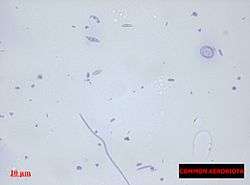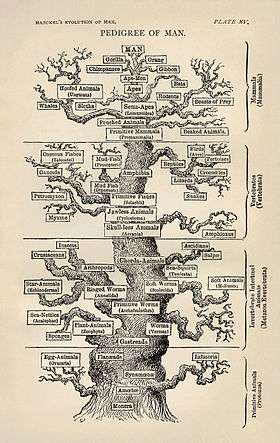Aerobiology
Aerobiology (from Greek ἀήρ, aēr, "air"; βίος, bios, "life"; and -λογία, -logia) is a branch of biology that studies organic particles, such as bacteria, fungal spores, very small insects, pollen grains and viruses, which are passively transported by the air.[1] Aerobiologists have traditionally been involved in the measurement and reporting of airborne pollen and fungal spores as a service to allergy sufferers.[1]

Some common air-borne spores
The first finding of airborne algae took place in Germany in 1910.[2]
The minimum requirements published after a big consensus are an international standard to ensure the quality in Aerobiological method.[3][4]
See also
References
- "Spotlight on: Aerobiology". The Biologist. Royal Society of Biology. Retrieved 26 October 2017.
- Guadalupe Roy-Ocotla; Jorge Carrera (1993). "Aeroalgae: Responses to some aerobiological questions". Grana. 32 (1): 48–56. doi:10.1080/00173139309436419.
- Galán, C.; Smith, M.; Thibaudon, M.; Frenguelli, G.; Oteros, J.; Gehrig, R.; Berger, U.; Clot, B.; Brandao, R; EAS QC Working Group (December 2014). "Pollen monitoring: minimum requirements and reproducibility of analysis". Aerobiologia. 30 (4): 385–395. doi:10.1007/s10453-014-9335-5. S2CID 71976311.
- Oteros, J.; Galán, C.; Alcázar, P.; Domínguez-Vilches, E. (January 2013). "Quality control in bio-monitoring networks, Spanish Aerobiology Network". Science of the Total Environment. 443: 559–565. Bibcode:2013ScTEn.443..559O. doi:10.1016/j.scitotenv.2012.11.040. PMID 23220389.
This article is issued from Wikipedia. The text is licensed under Creative Commons - Attribution - Sharealike. Additional terms may apply for the media files.
